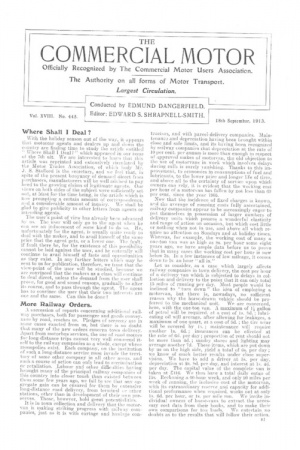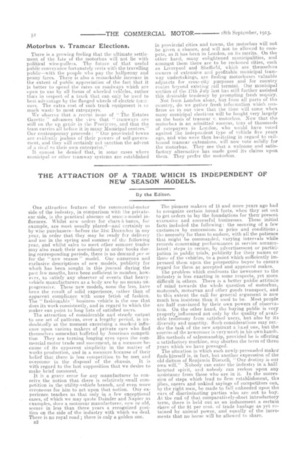Conducted by EDMUND DANGERFIELD.
Page 1

Page 2

If you've noticed an error in this article please click here to report it so we can fix it.
Vol. XVIII. No. 44 Editor: EDWARD S. SHRAPNELL-SMITH. 1 8th September, 1913.
Where Shall I Deal ?
With the holiday season out of the way, it appears that motorcar agents and dealers up and down the country are finding time to study the article entitled " Where Shall I Deal'?" which appeared in our issue of the 7th ult. We are interested to learn that, this article was reprinted and extensively circulated by the Motor Trades Association, of which body Mr. J. S. Stafford is the secretary, and we. feet that, in spite of the present buoyancy of demand direct from p irchasers, manufacturers will be well advised to pay heed to the growing claims of legitimate agents. Our views on both sides of the subject were sufficiently set out, at least for the time being, in the article which is now prompting a certain amount of correspondence, and a considerable amount of inquiry. We shall be glad to give publicity to other letters from agents or intending agents.
The user's point of view has already been advanced be its. The user will only go to the agent when he can see an inducement of some kind to do tat. He, unfortunately for the agent, is usually quite ready to deal with the maker, and to avail himself of the same price that the agent gets, or a lower one. The fault, if fault there be, for the existence of this possibility cannot be laid against, the user, and he naturally will continue to avail himself of facts and opportunities as they exist. In any further letters whieli may be sent to us for publication, therefore, we tiust that the view-point of the user will be studied, bemuse ire are convinced that the makers as a class will continue to deal direct, unless the demand from the user shall prove, for good and sound reasons, gradually to alter its course, and to pass through the agent. The agent has to convince the user that their two interests are one and the same. Can this be done'?
More Railway Orders.
succession of reports concerning additional railway purchases, both for passenger and goods conveyance. by road, reaches us. Pledges of aecreery are in some cases exacted from us, but there is no doubt that many of the new orders concern town delivery. Apart from motorbus services, the use of road motors for long-distance trips cannot very well commend itself to the railway companies as a whole, except where monopolies exist. Each company, on the institution of such a long-distance service must invade the territory of some other company in all other areas, and such a course of action can only lead to recrimination or retaliation. _Labour and other difficulties having brought many of the principal railway companies of this country into closer touch than existed between them some few years ago, we .fail to see that any aggregate gain can be ensured for them by extensive long-distance road delivery, from terminal ether atations, other than in development of their own preserves. Those, however, .hold great potentialities.
It is in town collection and delivery that the motorvan is snaking striking progress with railway companies, just as it is with cartage and haulage con tractors, and with parcel-delivery companies. :Maintenanoa and depreciation having been brought within close and sate limits, and its having been recognized by railway companies that depreciation at the rate of 10 per cent. per annum is more than enough in respect or typrov,A.1 makes of inotorvan, the old objection to the use of motorvans irt work which involves delays during calls is surely vanishing. Thanks to this improvement, to economies in consumptions of fuel and lubricants, to the lower price and longer life of tires, and above all to the certainty of service upon which owners can rely, it is evident that the working cost per hour ol a motorvan has fallen by not less than 60 per cent, since the year 1905. Now that the incidence of fixed charges is known, and the average of running costs fully ascertained, railway companies appear to be increasingly eager to put themselves in possession of larger numbers of delivery units which possess a, wonderful elasticity and range of action on occasion, but which cost little or nothing when not in use, and above all which require no attention co Sundays and at holiday times. -Whereas, for example, the working cost of many a one-ton van was as high as 8s. per hour some eight years ago, we have ample-data before us to prove that in many cases the working cost per hour is now below 3s. In a few instances of low mileage, it conies down to is. an hour "all in."
Let us consider, as a case which largely affects railway companies in town delivery, the cost per hour of a delivery van which is subjected to delays in collection and delivery to the point that it can only total 15 miles of running per day. Most people would be inclined to "turn down" the idea of employing a motorvan, but there is, nowadays, no sufficient reason why the horse-drawn vehicle should be preferred to the mechanical unit. We. are concerned, here, with the one-ton van. A maximum of ni gallon of petrol will be required, at a cost of is. 8d. ; lubricating oil will average, after allowing for leakages, a maximum of one quart, at a cost of 5d. ; the tire wear will be covered by Is. ; maintenance will require another Is. Gd.; insurances can be effected at the rate of 6d. per day ; proportion of rent should not be more than 4d, ; sundry stores and lighting may average another 7d. These items, which are put down by us on the high side, yield a total of Os. per day ; we know of much better results under close supervision. We have to add a driver at 5s. per day, depreciation at 2s. 8d. per day, and interest at is. 4d. per day. The capital value of the complete van is taken at l',116. 'We thus have -a total daily outgo of 15s. Beekoning a. 60-hour week, and only 90 miles per week of :cunning, the inclusive cost of the motorvarr, with its extraordinary reserve and capacity for additional performance when required, works out at only Is. 6d. per hour, or is. per mile run. We invite individual owners of horse-vans to extract the necessary cost data from their books, and to make their own comparisons for ton loads. We entertain no doubts as to the results that will follow their action.
Motorbus v. Tramcar Elections.
There is a growing feeling that the ultimate settlement of the fate of the motorbus will not lie with political wire-pullets. The future of that useful public conveyance fortunately rests with the travelling public—with the people who pay the halfpenny and penny fares. There is also a remarkable increase in the extent of public appreciation of the fact that it is better to spend the rates on roadways which are open to use by all forms of wheeled vehleles, rather than in respect of a track that can only be used to best advantage by the flanged wheels of electric tramcars. The extra cost of such track equipment is so much waste to most ratepayers. We observe that a recent issue of " The Estates Gazette " advances the view that " tramways are still on the up grade in the Provirces, and that the tram carries all before it in many Municipal centres." Our contemporary proceeds : " Our provincial towns are evidently jealous of their powers of self-government, and they will certainly not sanction the advent of a rival ra their own enterprise."
It cannot be denied that, in sonic cases where municipal or other tramway systems are established in provincial cities and towns, the motorbus will not be given a chance, and will not be allowed to cornpete, as it has been in London, on its merits. On the other hand, ninny enlightened municipalities, and amongst them there are to be reckoned cities, such as Liverpool and Sireflielal, which are themselves owners of extensive ard profitable municipal tramway undertakings, are finding motorbuses, valuable adjuncts for cross-city purposes and for country routes beyond existing rail termini. Our municipal section of the 17th July last has still further assisted this desirable tendency by prompting fresh inquiry.
Not from London alone, but from all parts of the country, do we gather fresh information which eonfirms us in our view that the time will come when many municipal elections will be fought very largely on the basis of tramcar v. motorbus. Now that the motorbus is an admitted success, tens of thousands of ratepayers in London, who would have voted against the independent type of vehicle five years ago, and who were then hesitating in regard to railbound tramcar extensions, will now vote solidly for the motorbus. They see that a welcome and satisfactory alternative has made good its claims upon them. They prefer the motorbus.






















